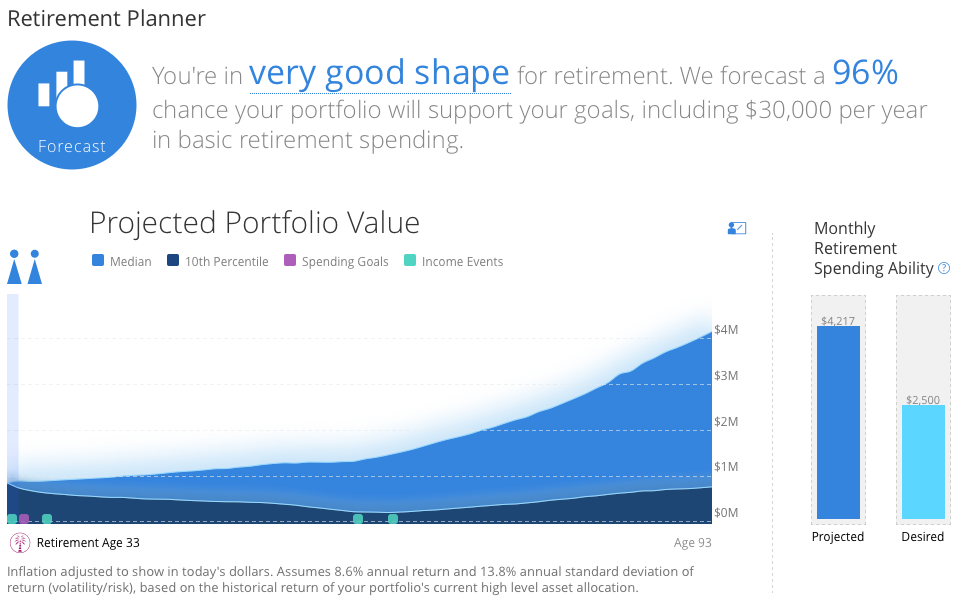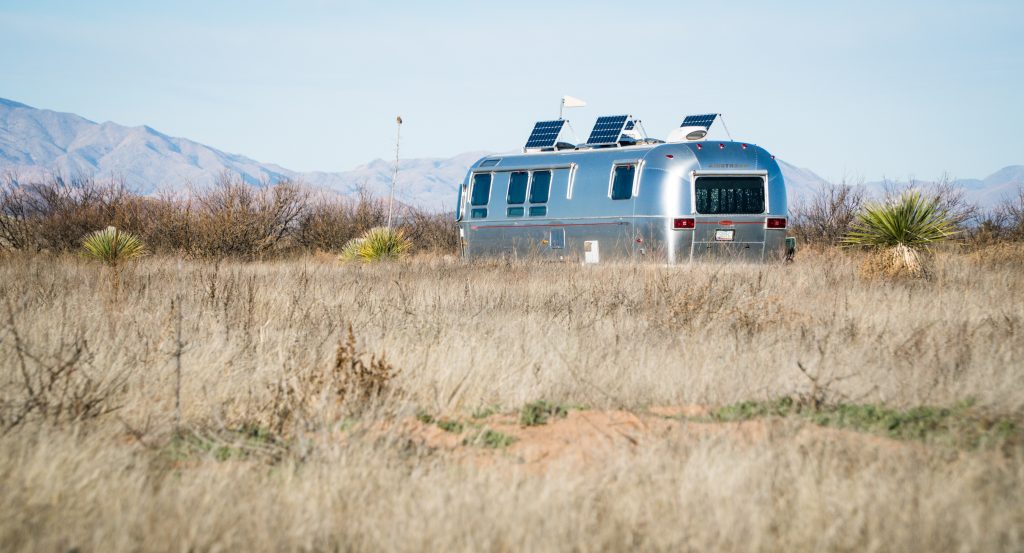How to retire early: A 4-step guide to quitting the rat race at nearly any age
How to retire early at any age, you ask? I retired at 35 and my wife at 33, and this is the 4-step process we used to make it happen.

I'll just come right out and say it: I retired at 35. My wife retired early at 33. When it comes to the question "how to retire early", I think we have some wisdom to add to the conversation.
As you learned in my early retirement FAQ (one of my most well-read posts!) my wife and I enjoyed some awfully cool advantages in our childhood that helped set the stage for an early departure from full-time work.
Things like:
- We grew up in loving and uplifting families
- We both earned high technology salaries
- We were taught the value of money early on
These advantages definitely helped, but let's also be clear: Though we made plenty of financial mistakes, both my wife and I also made decisions that supported early retirement. We wanted out of corporate America bad enough.
And, we re-prioritized our whole life to make it happen.

We both went to college and earned marketable degrees. We both showed up for work every damn day and did our best to be valuable members of our teams. We also prioritized early retirement enough to save 70% of our combined salaries after we got married in 2014.
We made the decisions to make this happen. Even with our positive upbringing, early retirement wasn't handed to us on a silver platter. That's not how this works.
We made this happen, and we used four key techniques to set the wheels in motion. We retired early because we made the right decisions. These decisions:
- We prioritized early retirement overspending
- We tracked our spending meticulously
- We automated everything that we could, and
- We spent money on things that we valued the most
We will discuss each point below. Ready? Settle in.
How to retire early: Your 4-step guide
Step 1: Prioritize early retirement over spending money
To retire early, we need money. Early retirees may not need millions, but we definitely need enough cash to fund our lifestyle without any income and without consumer debt. Debts murder your chances at quitting early.
How much did we save? We saved around 70% of our income every month before we called it quits from full-time work. That adds up fast.
Some retirees saved more while many others set their sights on saving at least 50% of their income. Whatever the percentage, early retirees just SAVE A TON.
Not only does saving a bunch of money help acquire the wealth needed to see early retirees through their much longer retirement timespans, but it also helps to establish healthy lifestyle decisions, like living sensibly, understanding “enough” and recognizing what truly makes us happy in life.
And, getting rid of debts and refusing to accumulate more. If you're in debt, getting out of debt is priority #1. If you're not in debt (hooray!), avoiding future debt is your biggest priority.
Remember, even if you aren’t pulling in 100 Gs a year, early retirement is still possible. Don't give yourself a reason to not try.
Before calling it quits, we saved as much as possible. And, we made life decisions consistent with our motivation to quit the rat race.
Literally, it is as easy as that – I realized that the more we save, the earlier we can retire. My wife and I prioritized retirement over spending money by saying “no” to invitations to dinners and sporting events, or anything that costs money that won’t bring genuine happiness into our lives.
No more $100 date nights, or spending cash on cable or satellite television, or an expensive phone. These changes have made a world of difference and believe it or not, neither of us feels like we are “sacrificing” happiness because those things never TRULY made us happy, to begin with.
Step 2: Know where every cent of your money is going
One of the best ways to save is to know where your money is being spent every single month. I haven’t met very many early retirees who don’t have a precise understanding of how much they spend – AND ON WHAT.
The reason is simple: It's nearly impossible to cut back on your expenses if you don't know where you're spending money. Without a precise understanding of outgoing cash flow, making intelligent decisions about where to cut will be next to impossible.
This step is a prerequisite to intelligent money decisions.
This process need not take hours and hours to keep up with, either – once your initial system of tracking your expenses is set up, maintaining it should be as easy as plugging numbers in – and sometimes, not even that!
Web-based applications like Personal Capital and Mint can help you get started. And, this is how we approach tracking our expenses.

Month after month, my wife and I meticulously budgeted and knew where every dollar that we spend every month was going.
My rocket scientist wife (literally!) took the reigns on this and knows how much we spend on, say, potatoes from month to month, or gas for our cars as well as discretionary spending that we choose to drop money on (I enjoy Vodka tonics in the evening, for example, and we account for these kinds of expenses within our budget).
We have a category in our budget to account for every dollar that leaves our bank account, and whenever we feel like we’re spending too much money, this is the first place that we look.
Step 3: Automation makes saving money automatic
Automation is the key to sound financial practices, period.
Automation means you’re no longer responsible for remembering to pay your bills or fund your goals by saving money or investing in the stock market...or anything else when it comes to money.
It completely removes the need to be disciplined. You set it up once and literally forget about it. The computers take over at that point, doing exactly what you told them to do – repeatedly and meticulously.
How does financial automation work?
When my wife and I worked full-time jobs, we maxed out both of our 401ks, and our contributions came out of our paychecks automatically. We set it all up once and literally forgot about it. It just happened automatically.
Our mortgage was paid automatically. Cable television (which we eventually ditched), telephone service, insurance, everything that could be made automatic, we did. Automation made this all stupid easy.
We even set up recurring monthly transfers from our checking account into an Ally savings account that we used as our emergency fund.
Eventually, we amassed a whopping four years of living expenses in that Ally savings account, and we’ve earmarked that money to be used whenever the economy takes a turn for the worst.
If your financial life isn't fully automated yet, here's what to do
If your company offers a 401k plan, sign up!
Use that sucker, because it’s one of the best ways that exist to save you money. 401k money is pre-tax, which means before the government gets its hands on your money, it can be put aside for your retirement.
It’s all yours.
You only pay taxes on it when it's withdrawn later in life (during your retirement). 401ks also reduce your taxable income, which lowers your tax responsibility to the government each and every year.
A 401k is a no-brainer.
If you don’t have an emergency fund (or a savings account), start one. Use recurring monthly transfers from your checking account to stash money into that account. Strive to accumulate at least three months of living expenses in cash. We use an interest-bearing Ally savings account for our emergency fund, which generates a little income month-to-month.
Automate your credit cards and recurring payments. Setup recurring monthly payments to pay your credit cards off in full. Interest on credit card balances kills our chances of getting ahead. Never carry a balance. Same with any recurring fee, like your mortgage. Don't make yourself remember.
Step 4: Spend money on things that provide immense value
Things that lose value (aka "depreciating assets"), aren't what most early retirees spend the bulk of their money on. That is, unfortunately, what the majority of people spend their hard-earned dollars to buy.
For my wife and me, value came in the form of experiences, not things.

Today, I would much rather take an inexpensive vacation to somewhere I love (like Sedona, AZ for example) than get stuff wrapped up as gifts.
Early retirees are over “stuff” and have often found that the less stuff they have, the more simple life becomes. Why? Maintenance and storage, baby! Who wants to spend 50 years of blissful retirement with a bunch of crap in the closet to deal with every time the door is slid open?
Not this guy.
How we are following this habit: Both my wife and I don’t want stuff anymore, so we get each other the gift of experiences.
During Christmas of 2015, we took a trip out to Key West, FL. A couple of months after, we visited the Albuquerque Hot Air Balloon Fiesta. Also in 2015, we hiked beautiful Glacier National Park and began the year in Orlando, FL for a Disney World family vacation.

Remember, travel does not have to be expensive. Credit card hacking is one technique to keep costs low, and the willingness to stay outside of PRIME locations helps tremendously as well. Drive instead of fly when you can and it makes sense. In Glacier National Park, my wife and I stayed outside of the park to save substantial cash.
If your definition of value isn't travel, that's fine. Whatever it is, understand that early retirement isn't just about not spending money. It's about spending money on those things that provide the most value.
Whatever that is, understand it. Know it. And, be honest with yourself about whether your money is actually going to support that value.
Bonus: Be an optimistic person
Certainly, if you’re looking to retire early and enjoy a life outside of the office, you gotta be pretty damn optimistic about the future. The thought that your stash will last you 30, 40 or even 50 years or more without having to work means you’re generally positive about the future and believe that things will work out.
This level of optimism applies to everything in life, not just early retirement. Early retirees take a glass half full approach to most things, from making life-altering decisions about work to picking the right wine to sip on during dinner – and everything in-between. They expect things to go well, and as we know from the powerful placebo effect, this phenomenon is very real.
After all, how many early retirees do you know that are mad all the time?
Note: Of course, we are not talking about “blind” optimism. Early retirees are always wise to plan ahead and account for when things do not go as planned. One must be a realist and understand the realities of the world while letting optimism take us to some truly amazing places in life. It definitely has for my wife and me.
How we are following this habit: Except when it comes to my fantasy football team, I’m a damn positive person. So is my wife (luckily, her fantasy team is superior to mine!). We believe in the general goodness of the world and don’t let the evening news cloud our outlook on life.
Over the years, we have realized that attitude is an important key to keeping your head on straight, and our positive attitudes help to bring us through each and every day as we work towards financial independence and early retirement.